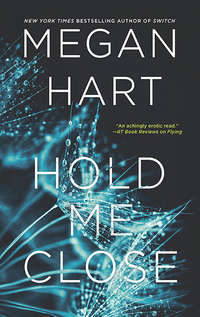
Полная версия
Lovely Wild
“What do you mean, you tried?” Leon’s fork spattered red sauce on his white shirt, which Mari will put in the laundry later to soak so that it doesn’t stain. “I expect more from you than trying. You can do better than that. It’s not too difficult for you. You’re a smart girl.”
She has explained in the past, or tried to, that it wasn’t that the books he chose for her were too difficult. She could read the words. She could understand the meanings. She simply couldn’t understand what they were about.
“Anne of Green Gables is a classic,” Leon continued. “All girls your age should read it.”
Anne of Green Gables was about a girl with red hair who is adopted by a family who really wanted a boy. Mari supposed Leon thought she might be able to identify with the concept of being adopted, and in a way she did. But the rest of it, the talk of clothes and school and friends and love...that, Mari did not comprehend.
She said nothing. She ate her dinner and packed away the leftovers carefully, letting her fingertips dance over the plastic containers stacked in the refrigerator when Leon couldn’t see and tell her to keep her hands still. She washed the dishes and put them away, and she remembered not to sing under her breath.
“My son,” Leon said from the kitchen doorway. “Ryan. He’ll be here in about an hour.”
Leon had spoken many times of his son. He’d shown her pictures and video movies of Ryan as a child. Leon had even given her some of Ryan’s old things, not like they were hand-me-downs but as though they were precious gifts she should be honored to claim.
In fact, a few of the things he gave her were precious to Mari. Not the cast-off football jersey that didn’t fit and still smelled slightly of sweat. And not the boxes of plastic bricks she’d never really learned to put together to make something bigger. But the stuffed bunny, fur worn off on the ears and the tail entirely lost—that she loved. That she still slept with next to her at night though at fifteen she had abandoned all her other dolls and stuffed toys. Leon, who hadn’t asked her to call him father but encouraged the use of his first name, had given Mari that toy when she was much younger and had nothing left of her life before. Later, there were fancy toys and brand-new dresses, brought by well-meaning people who had no idea of what she held as valuable. But the bunny that once belonged to Ryan was something Mari would forever hold precious and dear.
In the year and a half since she’d been living here, she’d never even known Ryan to call the house. There’d been some trouble with Leon’s wife when he decided to give Mari a permanent home. Mari didn’t know the whole story, had only caught bits and pieces overheard in shouting conversations on the phone late at night when he thought she was asleep. She knew the doctor’s wife didn’t want to become a mother to some random, cast-off girl nobody else wanted, and she couldn’t say she blamed the former Mrs. Doctor Calder. After all, Mari’s own mother hadn’t wanted her, either.
It might’ve been the trouble with Ryan’s mother that kept him away, or something simpler. He’d been in college, then med school. He was a grown-up. With a girlfriend, Leon said with a small curl of his lip that told Mari exactly what he thought of that. And though Leon had kept many of Ryan’s things and felt free enough with them to give them away, he’d also been honest about the fact he wasn’t very close with his son.
Mari, Leon often said, was a second chance.
Since Leon Calder was the only father Mari had ever known, he was her only chance.
But now Mari stood in the kitchen, in shadow, watching Ryan come in from the outside. He stamped his feet to get the snow off his boots. Brushed it off his shoulders. It was melting in his blond hair, leaving rivulets of water trickling down his temples and making puddles from the hems of his pants on the floor.
He didn’t see her, and she didn’t want him to. Mari went quiet; she went still. She was silence. Not a breath, not a sigh, not a blink. And Ryan passed by her little corner of shadow and headed for the living room, calling out for his dad.
She had time to run upstairs and hastily comb through her hair. Put on clean clothes. She didn’t have many pretty things. Leon preferred her to dress in something like a uniform. Appropriate clothes, he said, because he wanted nobody to say there was anything inappropriate going on. People already had enough reason to whisper, he said, though he’d never explained exactly what that meant. Mari didn’t like the plaid skirt, the white blouse, the saddle shoes and knee socks. She’d rather have the sorts of clothes she’d seen the kids on TV wearing. Jeans and sneakers. Now, though, she wished she had something pretty. Flowy. Something soft, like a princess would wear.
For the first time, she understood why Anne cared about what dress she wore to impress Gilbert Blythe.
When she crept down the stairs again, her heart pounding, Mari saw Ryan in the living room with his dad. They were drinking from glasses filled with Scotch. Ryan didn’t look very much like his father, but they both turned at the same time and she saw there was something very much the same in their smiles.
“Ryan,” said Leon, “this...is Mari.”
“Hey, little sister,” Ryan said. “What have you done?”
“Nothing,” Mari answered and was confused when Ryan choked with laughter. “What?”
“She doesn’t know Billy Idol, Ryan.”
“Oh. Right.” Ryan nodded like he understood, but the quirk of his smile said he didn’t. Not really.
He was the most beautiful man she’d ever seen. He was her brother, Leon said, but there was nothing brotherly about the way he looked at her.
Mari wanted him like some girls wanted rock stars or movie stars or TV celebrities.
Later, when Leon had gone to bed and Mari was still in the kitchen scrubbing the floor because of the mess Ryan’s shoes had made, he found her. “Hey. What are you doing?”
She looked up at him. “Cleaning. I don’t like it to be dirty.”
“My dad makes you clean like that? Doesn’t he have a housekeeper?”
“I don’t mind.” It had never occurred to her that it was something to be ashamed of, taking care of Leon. After all, he’d taken care of her.
“Pretty girl like you shouldn’t be up late scrubbing the floor. You should be out having fun.” Ryan’s gaze had cut away from her before sneaking back like a dog looking to steal from the table.
The next time he came home with a pink T-shirt with a unicorn covered in sparkles on the front of it. It wasn’t a princess dress, but Mari would eventually wear it to shreds. He took her to the movies, which she hated, too dark, too loud, the chemical scent of the popcorn butter distasteful. He took her to a restaurant, and she liked that much better, especially when she got a giant sundae for dessert. Three days he spent at home, three days he spent teasing her into laughter and making her shine.
“You take care, kid,” he told her on the day he left and chucked her under the chin.
She watched him walk to the car, her hand raised in a half wave that was the best she could muster, considering the thought of him leaving her so soon was enough to make her want to curl in a ball beneath the blankets and cry.
A day later, he called the house to talk to her. Not to his father, who handed her the phone with a raised eyebrow, but no comment. Mari took the phone curiously, uncertain, but the moment she heard Ryan’s voice, everything that had seemed dark became light.
For two years, Ryan was there when she needed someone to talk to, though in truth she often did more listening than speaking. He taught her how to drive. Ryan was there when Leon didn’t understand what a young girl needed—pretty clothes, not dowdy uniforms. Trips to the park and the zoo and the mall instead of being kept at home and out of sight. Ryan was the one who told his father that Mari needed to be allowed to wear mascara, get her ears pierced, if she wanted to. To look and act like other girls her age, even if she’d grow up to be a different sort of woman. He was her champion, her advocate.
He was her prince.
And then, Leon died.
She was not surprised when it happened, though it was sudden. One moment he was sitting in front of the meatloaf she’d cooked for dinner, asking her about her studies—she was a month from finishing the homeschooling courses that would give her a GED—and the next he was facedown in the mashed potatoes. A few hours after that, the man who’d given her a life had lost his.
Death was nothing new to her. She’d seen it on the farm with chicks and puppies and kittens, and her grandmother, too. Some part of her had been waiting for Leon to abandon her since the day he’d taken her home. She wept, of course, at the loss. Leon had saved her...but he’d never been her savior, had he? Not really.
She had a prince for that.
The night before Leon’s funeral, Ryan came home late. Mari was waiting for him in the living room in front of the fireplace. She didn’t know about seduction, but it turned out she didn’t have to. She wanted him and now she had him.
Eight months later, they were married.
* * *
Beside her sleeping husband, Mari thinks of all this now. How some choices were made for her and some she’s made for herself, but that the whole of her life has led her to this man, this house, this space. This life. And it’s a good life, full of love and so much more than she’d ever have guessed she could have.
If Ryan says they need to go back, he must have a good reason. And if she trusts him, as she’s always done, then she also has to trust that everything will be all right. When he tells her he’s taking her home, he has no real idea of what that means to her and never has. She doesn’t want him to know. But she trusts Ryan as much as she loves him, and that means Mari will follow him wherever he thinks he needs to go.
Ryan is not the first man to rescue her, but Mari has always believed he would be the last.
TWELVE
IT WOULD’VE BEEN a total cliché for Kendra to hate her parents for this. They’d taken her away from her friends, the pool, all the stuff she’d been looking forward to this summer. Her riding lessons. She’d been planning to do the adult summer reading program for the first time, and it was a better one, because the little kids get stuff like coupons for Rita’s Italian Water Ice and Subway, but when you did the grown-up program you got entered for gift certificates to Amazon.com and places like that. She’d already put together her reading list, and though her dad had promised there’d be a library where they were going, Kendra knew it wouldn’t be the same.
She totally should’ve hated them. Her dad, because it had been his stupid idea. Her mom for going along with it the way she always did, not even asking any questions. Not even complaining. It would’ve been too easy to blame her parents for ruining her life when all it really meant was she had to spend a few months in some country town while her parents got their act together. That wasn’t life. That was just the summer.
It could’ve been worse.
Or maybe not, she thought as her mom at last pulled up in front of a peeling, white-painted farmhouse with a sagging front porch and windows like dead eyes. This looked pretty gross. They got out of the car at the same time as her dad and Ethan got out of his. Dad gave her and Mom a gigantic, toothy grin.
“Well? What do you think?”
“I think it stinks.” Ethan put a hand to his nose. “Pee-yew.”
“It’s a skunk,” Mom said in a quiet voice. “That’s what they smell like.”
“Smell that, kids? That’s a skunk!”
“Dad,” Kendra said, “you don’t have to sound so excited.”
Her dad grabbed her mom’s hand. Then he kissed her. Kendra turned away.
Still couldn’t hate them.
Across the raggedy field that could hardly be called a yard, in the woods, something moved. The leaves, mostly green, turned pale sides up like the wind had ruffled them, but the weeds and grass were barely moving.
The inside of the car had been cold enough for her to need a sweatshirt, but out here within seconds her armpits started sweating. The sun was bright enough that she had to put up a hand to shield her eyes—monkeybrat had totally wrecked her favorite sunglasses and she hadn’t gotten to the mall to replace them before Dad packed them up to bring them here. Kendra blinked against tears she blamed on the sun, even though maybe it was really because of something else. Her vision blurred, and she blinked hard to clear it, trying to see what had caught her eye.
Ethan made a face. “I don’t like it here.”
“Shut up, monkeybrat.”
Ethan sighed heavily and kicked at the dirt under the toe of his sneakers. “I don’t have to.”
Kendra looked over her shoulder. Her mom and dad were still next to the car, their heads bent in conversation. Neither of them looking this way. “I saw something in the woods.”
“Like what?” Ethan looked up. “Dad said we could get a dog.”
“You don’t want a dog, not really. You’ll have to clean up its poop and stuff.” Kendra took a few steps away from the car toward the field and the woods beyond it, not really paying attention to her brother.
“Not out here, I won’t. He can poop in the yard or in the field. I want to call him Zipper.”
At this, she looked at him. “Zipper? Why would you want to name the dog that?”
Ethan shrugged. “I just like it. And you’d like a dog, Kiki. I bet you would, anyway.”
Kendra looked again at the car, where her parents were leaning toward each other, faces serious. Her father’s mouth moved while her mom stayed as silent as she had for the entire trip. Her dad’s hand went out to caress her mom’s hair.
It felt sort of creepy to watch them like that, like maybe they might start to make out again or something, so Kendra looked once more at the house. It sat at the end of a really long lane, the trees so close on either side that it had been like driving through a tunnel. Only one other house on the lane, and it had been much closer to the main road. To the side of the driveway was a crumbling sort of garage or barn off to the right, and beyond that the field of tall grass and wildflowers. The trees came right up to the edge of the field, and beyond that, a mountainside littered with scrubby pines.
“I don’t like this place,” Ethan muttered again, scuffing at the driveway and sending up a small cloud of dust.
“It’s only for the summer. Dad said.”
He snorted. “Yeah, right. I bet we have to live here forever.”
A shiver tickled down her spine at that. Being the new girl in a new school was the sort of thing they made movies about, but something about this place told Kendra she wasn’t going to meet some super hot jock who’d totally fall in love with her even though she didn’t fit in with the rest of the cool kids. The problem was, at her own school she already was one of the cool kids. At least cool enough. She really didn’t want to start over. Not out here in the middle of nowhere.
Nothing moved in the field or in the trees beyond but a couple of birds that took off into the sky. Kendra shaded her eyes again to follow them. Her dad came up behind her to squeeze her shoulders until she pulled away.
“Isn’t this great?”
“Mom, are you okay?”
Her mom was also looking toward the woods, and when Kendra spoke to her, it took her a few seconds to turn. “Fine.”
She moved closer to Kendra and put an arm around her shoulders. Together they looked across the field, into the trees. Lots of shadows there. Whatever she’d seen moving could still be in there, just hidden.
Something shivered inside her.
THIRTEEN
HERE IS THE house where everything happened.
This is what Mari thinks as she glides on bare feet over floors that have been covered in unfamiliar carpet, tile, even laminate wood. She seeks out the places she knew best.
The closet beneath the stairs is painted brightly now and not hung with veils of tattered cobwebs. Inside is a bucket, mop, broom, vacuum cleaner. Cleaning supplies hang neatly on pegs and wire shelving.
The space beneath the sink is impossibly tiny. She could fit one leg inside it, maybe. Certainly not her whole body the way she used to. She traces the glimmer of curving silver pipes with her fingertip. This, like the gleaming stainless steel sink above, is new. At least to her.
So much is new. Looking at it is like seeing two photos, one transparent and laid atop the other so that both can be seen but neither clearly. She blinks and blinks again, shaking her head against this feeling. She clutches the sink, her head bent, eyes closed. She listens for the sound of chair legs scraping on worn linoleum and the mutter of voices speaking above and around but never to her. The clatter of the dogs’ nails and their soft woofing, begging for scraps or fighting over what fell from the table.
She turns to see the table, also new. She can crouch beneath this one, though it’s round with a pedestal center and has no knitted afghan thrown on top of it. It’s not a cave, and the cool tile floors hurt her butt and knees when she crawls beneath. Still, Mari draws her knees to her chest and presses her forehead to the bare flesh. She listens.
And this, she knows. She remembers. The creak of an old house settling doesn’t change, even if you paint the walls and replace the flooring. Even if you clean it, the memory of all the dirt still remains.
Under the table, Mari draws in breath after breath. No longer small, she’s been made tiny again by this place. A little wild.
“Mama?”
“Yeah, honey.” She looks up to give her boy a smile.
Ethan crawls under the table with her. “Whatcha doing?”
“When I was a little girl in this house, I used to hide under the kitchen table. I was just remembering it, that’s all.”
“Oh.” Ethan is silent for a moment, his pose mimicking hers. Small knees drawn up to small chest, small chin digging into the tops of them. “Why did you hide?”
Mari opens her mouth to answer, but Kendra has entered the kitchen. She doesn’t see them immediately the way Ethan spotted his mother. Together, Mari and Ethan watch Kendra’s feet turn in a half circle. She’s wearing battered Converse sneakers just like the ones Mari had always wanted but had been denied as a teen, and something tight and tense unwinds a bit in Mari’s chest at the sight.
“Mom?”
Ethan clamps a hand over his mouth against a flurry of giggles. Mari knows Kendra will be angry if she looks under the table and sees them. She’ll think they’re hiding from her. But Mari can’t help laughing, either.
“What—” Kendra bends to look under the table. “Oh, God. What are you guys doing? Weirdos!”
“Come in, Kiki, there’s room.” Mari holds out a hand.
And maybe because it’s late and they’re in a new place or because Kendra’s in a good mood or for some reason Mari can’t figure, her daughter takes her hand and crawls beneath the table. There’s not enough room under there for all of them, but they scootch in close enough to make it work. Their knees bump. They grip each other’s hands and make a circle.
“Mama used to hide under the table when she was a little girl,” Ethan explains.
Kendra’s eyes are wide and blue. Her father’s eyes, though, not Mari’s. But they look at Mari with an awareness Ryan hasn’t had in a while, if ever. “How come?”
“Oh...” Mari shrugs. “My grandmother had a long old wooden table. A trestle table, I think they call it. With benches along the sides instead of chairs. Instead of tablecloths, she always had it covered with a few afghans she’d knitted herself. Orange, green, yellow.”
She can remember the stripes, the zigzag pattern of holes in the yarn that let in the light. If there’s one thing she could’ve taken with her from this house, it might have been one of those blankets.
“Like a fort,” Ethan offers.
“Yes. Something like that.”
Kendra looks upward, then around this table’s center leg at her mother. “But why did you hide?”
There is so much to be said, if only Mari could find the words, but they don’t come easily. They never have for her, and here in this house they seem to be slipping from her brain even faster. She doesn’t lie to her kids, but they’ve spent a lifetime not knowing everything there is to know about her. How can that be changed in a few minutes beneath a kitchen table in the house of her childhood, especially when she’s so uncertain of what really happened here, herself?
“Sometimes, people came,” Mari manages to say without fumbling. She breathes, remembering how Leon taught her to think the sounds of the words before saying them, so they wouldn’t stick in her throat. “My grandmother thought they’d take me away from her if they knew I was there. So, I hid.”
Kendra’s brow furrows. There are days she looks far older than her age, but now is not one of those times. “Would they have? Taken you from her?”
“Yes.”
Before anyone can ask her another question, a heavier tread sounds in the hall outside. They all look and go silent together. Ryan’s feet appear in the kitchen. His are bare, his ankles covered by the hems of his favorite pajama bottoms. His feet move toward the fridge, which opens.
Конец ознакомительного фрагмента.
Текст предоставлен ООО «ЛитРес».
Прочитайте эту книгу целиком, купив полную легальную версию на ЛитРес.
Безопасно оплатить книгу можно банковской картой Visa, MasterCard, Maestro, со счета мобильного телефона, с платежного терминала, в салоне МТС или Связной, через PayPal, WebMoney, Яндекс.Деньги, QIWI Кошелек, бонусными картами или другим удобным Вам способом.








